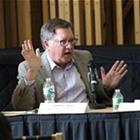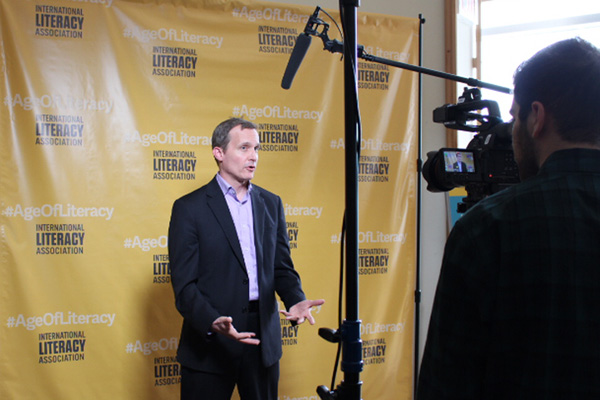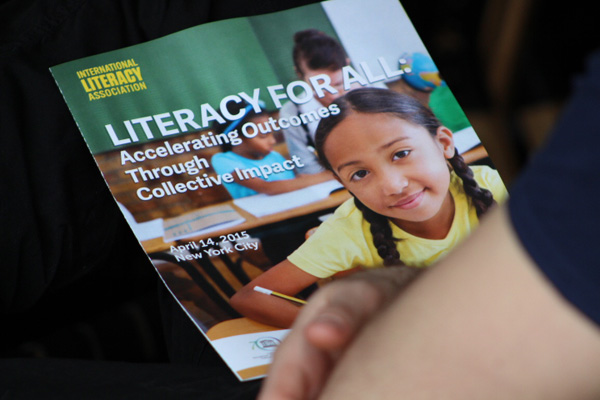 Collaboration was the overarching theme of the world-class panel convened Tuesday by the International Literacy Association, for its inaugural Leaders for Literacy Day.
Collaboration was the overarching theme of the world-class panel convened Tuesday by the International Literacy Association, for its inaugural Leaders for Literacy Day.
A full house at the International Institute of Education, located in United Nations Plaza in New York, listened to panelists ranging from corporate partners to academics share their thoughts and ideas on what is needed to advance literacy worldwide.
The panel included Susan B. Neuman, professor and chair of the Teaching and Learning Department at the Steinhardt School of Culture, Education and Human Development at New York University, and former U.S. Assistant Secretary for Elementary and Secondary Education;Steven Duggan, director of worldwide education strategy for Microsoft Corporation; Bernadette Dwyer, a lecturer in Literacy Studies at St. Patrick's College, Dublin City University; David L. Kirp, professor of Public Policy at the University of California at Berkeley; and ILA Executive Director Marcie Craig Post.
Liz Willen, editor-in-chief of The Hechinger Report, moderated the discussion; Allan E. Goodman, president and CEO of the IIE opened the event, and ILA President Jill Lewis-Spector also made remarks.
The panel convened to face some sobering facts. Around the world there are still 781 million adults who are illiterate; women account for two-thirds. According to the U.S. Department of Education, 14 percent of adults in the U.S. alone are functionally illiterate—a number that hasn’t budged in a decade, Post said. She characterized the problem as “vast in scope and stubborn in character.”
Lily Valtchanova, liaison officer at UNESCO, also cited the failure to meet the UN Millenium Development Goal to cut global illiteracy in half by 2015 and the need to move forward to attain new sustainable educational goals.
To battle this epidemic, the panel highlighted the role of technology, community, and how cooperation between nongovernmental organizations (NGO), corporations, and researchers can lead to innovative solutions and support for people struggling around the world.
Even in communities that aren’t fighting poverty or lacking in resources, the picture is not perfect, panelists said.
“We can’t talk about being digitally literate, we have to talk about becoming digitally literate,” Dwyer said. Without training teachers in the technology they already possess, the full potential of classroom technology cannot be realized.
More than that, there is an inequity in access to technology, Dwyer said. Tech access is widening the knowledge gap between the affluent and the impoverished, contributing to the rich getting richer and the poor getting poorer.

Microsoft, Duggan said, has recently turned its attention to the importance of literacy and creating tools for the most basic of needs.
“We’re only focused on literacy because we started to listen,” Duggan said. For nine months, Microsoft representatives asked educators about what foundational challenges they faced. The resounding response was literacy, as “it affects everything else.”
When Microsoft dug deeper, they found too few books were printed in minority languages around the world. Some children simply had no books with which to learn. In months, Microsoft was able to launch Lit4Life and the Chekhov Story Author App. Educators around the world can use these tools to write, design, and publish their books to a cloud accessible by students. A book recording option was added when the education team learned 31 percent of illiterate children live in an illiterate home.
Technology may not always be the answer, though. In many communities advocates need to go in and—like the Microsoft Education Team did—listen.
Neuman said while researching summer reading loss, she found one urban community that had not a single preschool-appropriate book available for children. More than 300 children would have to share one elementary-level book. For that community, it wasn’t about taking in computers—it was a desperate need for text.
Kirp said asking parents what they need elicits similar responses regardless of neighborhood.
“No matter who you ask, you’ll get the same kind of ‘We want for our kids what we didn’t have for ourselves,’” Kirp said. The specificity of those wants may shift from neighborhood to neighborhood, but the sentiment is universal.
Kirp himself uses the following standard: “I always think, would I want this [program] for a child that I love,” he said.
Moving quickly on challenges allows for the gift of failure, Duggan said. Failure is something educators everywhere, and organizations that want to help them, shouldn’t fear.
“Failure is great,” he said to a few chuckles. “We have to embrace a culture of failure, but we need real-time data and to fail quickly. When we fail, we learn.
“If we just focus on delivering some good services, not devices, we can scaffold literacy for all right now,” Duggan continued.
Post agreed that failure must become an option in the Age of Literacy to spur innovation, and it may be time to re-evaluate the way NGOs operate—to not fear failure in order to learn and to work together rather than against each other.
“We are diffusing power because we’re all vying for the small pot of money that is out there,” Post said. “We need to build meaningful partnerships.”
Duggan agreed, saying corporate/non-profit alliances are also vital to surmounting the huge challenges to achieving worldwide literacy.
“I’ve made some good connections [today] and I’m walking away with a lot of new e-mail addresses,” he said. “I’m opening up some interesting dialogs and I hope to open up even more.”

Attendee Pam Allyn, global literacy advocate and founder of the nonprofit LitWorld, was encouraged by the suggestion of collaborative action.
“I think collaboration is the key,” Allyn said. “I think in the past, NGOs have been extremely competitive… And I don’t think that’s right. I don’t think we’re serving children’s best interests that way…. Really, to put us all together is going to make the difference for millions and millions of children.”
Allyn was one of the many stakeholders from Nairobi to New York, including several ILA Board members, who participated in fast-paced Twitter chats on Tuesday, where literacy leaders shared experiences and strategies on how to engage today’s students, how to take charge of professional development, and how to become a powerful advocate. The virtual global discussions were part of a continuing campaign asking people around the globe, “How will you make this the #AgeofLiteracy?”
Several bloggers also participated in the exchange by making posts exploring the Age of Literacy theme.
Starting these conversations is the first step. In the future, ILA will convene more of panels to address challenges in eradicating illiteracy, and draw on the expertise of thought leaders to mobilize people in government, schools, and homes to start a literacy movement and spread literacy for all.
Interested in the cause? You can join the conversation here.
 April Hall is editor of Literacy Daily. A journalist for about 20 years, she has specialized in education, writing and editing for newspapers, websites, and magazines.
April Hall is editor of Literacy Daily. A journalist for about 20 years, she has specialized in education, writing and editing for newspapers, websites, and magazines.